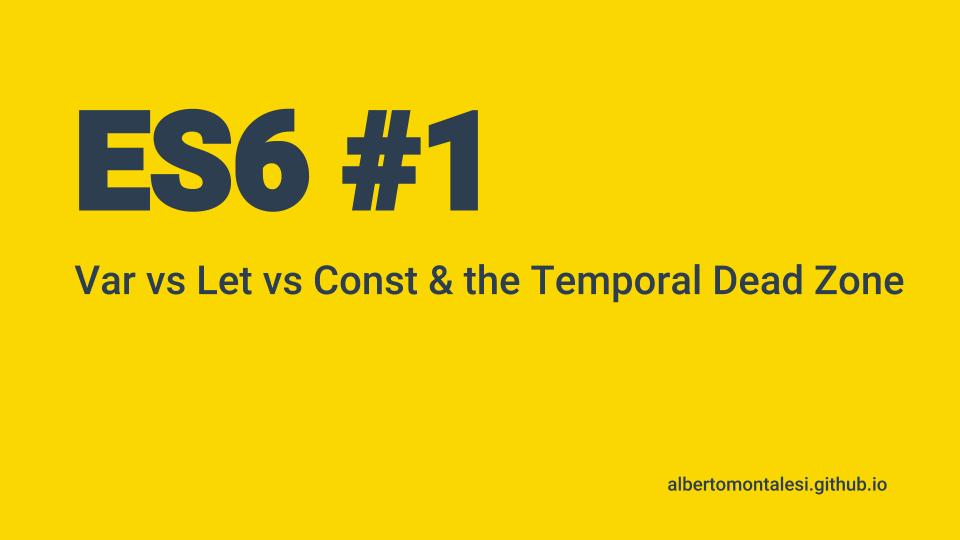JavaScript ES6 for Beginners #1: Var vs Let vs Const & the temporal dead zone

With the introduction of let and const in ES6, we can now better define our variables depending on our needs. Let’s have a look at the major differences between them.
With the introduction of let and const in ES6, we can now better define our variables depending on our needs. Let’s have a look at the major differences between them.
Var
var are function scoped, which means that if we declare them inside a for loop (which is a block scope) they will be available even outside of it.
for (var i = 0; i < 10; i++) {
var leak = "I am available outside of the loop";
}
console.log(leak);
// I am available outside of the loop
function myFunc(){
var functionScoped = "I am available inside this function";
console.log(functionScoped);
}
myFunc();
// I am available inside this function
console.log(functionScoped);
// ReferenceError: functionScoped is not defined
In the first example the value of the var leaked out of the block-scope and could be accessed from outside, whereas in the second example var was confined inside a function-scope and we could not access it from outside.
Let
let (and const) are block scoped, meaning that they will be available only inside of the block where they are declared and its sub-blocks.
// using `let`
let x = "global";
if (x === "global") {
let x = "block-scoped";
console.log(x);
// expected output: block-scoped
}
console.log(x);
// expected output: global
// using `var`
var y = "global";
if (y === "global") {
var y= "block-scoped";
console.log(y);
// expected output: block-scoped
}
console.log(y);
// expected output: block-scoped
As you can see, when we assigned a new value to our let inside our block-scope, it did not change its value in the global scope, whereas when did the same with our var it leaked outside of the block-scope and also changed it in the global scope.
Const
Similarly to let, const are block-scoped, but they differ in the fact that their value can’t change through re-assignment or can’t be redeclared.
const constant = 'I am a constant';
constant = " I can't be reassigned";
// Uncaught TypeError: Assignment to constant variable
Important This does not mean that const are immutable.
The content of a const is an Object
const person = {
name: 'Alberto',
age: 25,
}
person.age = 26;
// in this case no error will be raised, we are not re-assigning the variable but just one of its properties.
The temporal dead zone
According to MDN:
In ECMAScript 2015, let bindings are not subject to Variable Hoisting, which means that let declarations do not move to the top of the current execution context. Referencing the variable in the block before the initialization results in a ReferenceError (contrary to a variable declared with var, which will just have the undefined value). The variable is in a “temporal dead zone” from the start of the block until the initialization is processed.
Let’s look at an example:
console.log(i);
var i = "I am a variable";
// expected output: undefined
console.log(j);
let j = "I am a let";
// expected output: ReferenceError: can't access lexical declaration `j' before initialization
var can be accessed before they are defined, but we can’t access their value.
let and const can’t be accessed before we define them.
This happens because var are subject to hoisting, which means that they are processed before any code is executed. Declaring a var anywhere is equivalent to declaring it at the top. This is why we can still access the var but we can’t yet see its content, hence the undefined result.
When to use Var, Let and Const
There is no rule stating where to use each of them and people have different opinions. Here I am going to present to you two opinions from popular developers in the JavaScript community.
The first opinion comes from Mathias Bynes:
- use
constby default - use
letonly if rebinding is needed. varshould never be used in ES6.
The second opinion comes from Kyle Simpson:
- Use
varfor top-level variables that are shared across many (especially larger) scopes. - Use
letfor localized variables in smaller scopes. - Refactor
lettoconstonly after some code has to be written, and you’re reasonably sure that you’ve got a case where there shouldn’t be variable reassignment.
Which opinion to follow is entirely up to you. As always, do your own research and figure out which one you think is the best.
This was the first part of my ES6 for beginners course, check out the rest of them here.
You can also read this articles on medium, on my profile.
Thank you for reading.

Leave a Comment